Karachi polio killings: Vaccination workers shot
- Published
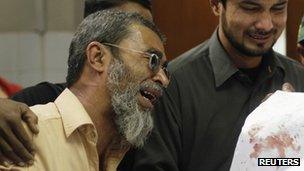
There were scenes of mourning in Karachi
Five female Pakistani polio vaccination workers have been fatally shot in a string of co-ordinated attacks - four within 20 minutes across Karachi.
The fifth woman was shot and wounded in the city of Peshawar in the north-west and later died of her injuries.
A UN-backed programme to eradicate polio - which is endemic in Pakistan - has been suspended in Karachi.
No group has said it carried out the shootings, but the Taliban have issued threats against the polio drive.
"These were pre-planned and co-ordinated attacks in various localities which took place within a span of 20 minutes," Imran Javed, a police spokesman told the BBC of Tuesday's attacks in Karachi.
Earlier reports said a male health worker had been shot dead in Karachi on Monday, but officials now say his death was not related to the polio vaccination drive.
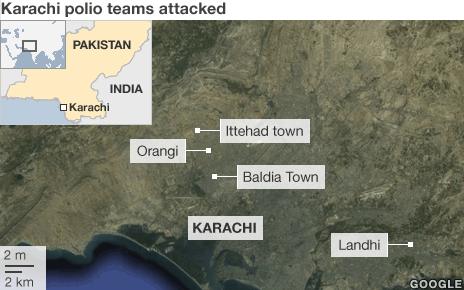
Prime Minister Raja Pervez Ashraf has condemned the attacks and praised the work of the polio vaccination teams, calling on regional authorities to guarantee their safety, Pakistan's APP news agency reported.
Pakistani health officials said the latest three-day nationwide anti-polio drive - during which an estimated 5.2 million polio drops were to be administered - had been suspended in Karachi, Pakistan's largest city with a population of 18 million.
There has been opposition to such immunisation drives in parts of Pakistan, particularly after a fake CIA hepatitis vaccination campaign helped to locate Osama Bin Laden in 2011.
Militants have kidnapped and killed foreign NGO workers in the past in an attempt to halt the immunisation drives, which they say are part of efforts to spy on them.
However, the Pakistani government "would continue to mount its effort on polio eradication," Mr Ashraf's special adviser Shahnaz Wazir Ali told the BBC.
Mrs Ali said protection would be provided to workers, and campaigns would be staggered if necessary.
"Clearly, we are now so close to eradicating the polio virus,... acts of this type, which are intended to dissuade us, will not deter us," she said.
Along with Afghanistan and Nigeria, Pakistan is one of only three countries where polio is still endemic.
Pakistan is considered the key battleground in the global fight against the disease, which attacks the nervous system and can cause permanent paralysis within hours of infection.
Almost 200 children were paralysed in the country in 2011 - the worst figures in 15 years.
Earlier this year, the Global Polio Eradication Initiative warned that tackling the disease had entered "emergency mode" after "explosive" outbreaks in countries previously free of polio.
The World Health Organization (WHO) said polio was at a tipping point, with experts fearing it could "come back with a vengeance" after large outbreaks in Africa and Tajikistan and China's first recorded cases for more than a decade.
Declaring polio a national emergency, the Pakistani government is targeting 33 million children for vaccination with some 88,000 health workers delivering vaccination drops.
Dr Bruce Aylward of the WHO told the BBC that vaccination programmes had been suspended in other countries before but that "when you're dealing with something as basic as the health of children, usually there can be common ground found".
Dr Aylward said he hoped for a "dialogue with community leaders who have positions of power to ensure root causes of this are being addressed and the perpetrators are brought to justice".
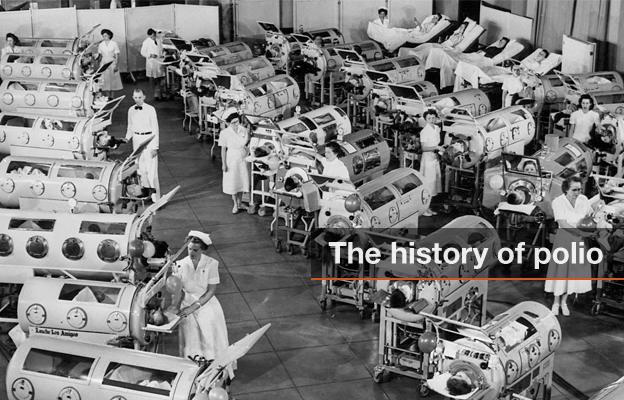
Poliomyelitis has existed as long as human society, but became a major public health issue in late Victorian times with major epidemics in Europe and the United States. The disease, which causes spinal and respiratory paralysis, can kill and remains incurable but vaccines have assisted in its almost total eradication today.
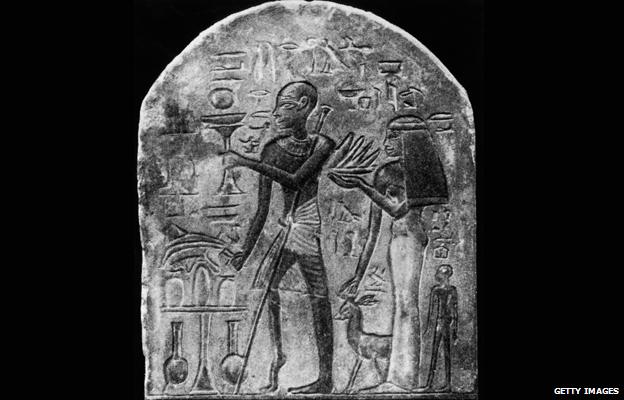
This Egyptian stele (an upright stone carving) dating from 1403-1365BC shows a priest with a walking stick and foot, deformities characteristic of polio. The disease was given its first clinical description in 1789 by the British physician Michael Underwood, and recognised as a condition by Jakob Heine in 1840. The first modern epidemics were fuelled by the growth of cities after the industrial revolution.
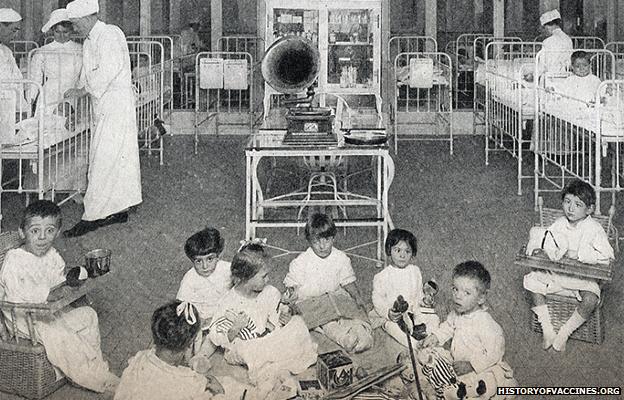
In 1916, New York experienced the first large epidemic, with more than 9,000 cases and 2,343 deaths. The 1916 toll nationwide was 27,000 cases and 6,000 deaths. Children were particularly affected; the image shows child patients suffering from eye paralysis. Major outbreaks became more frequent during the century: in 1952, the US saw a record 57,628 cases.
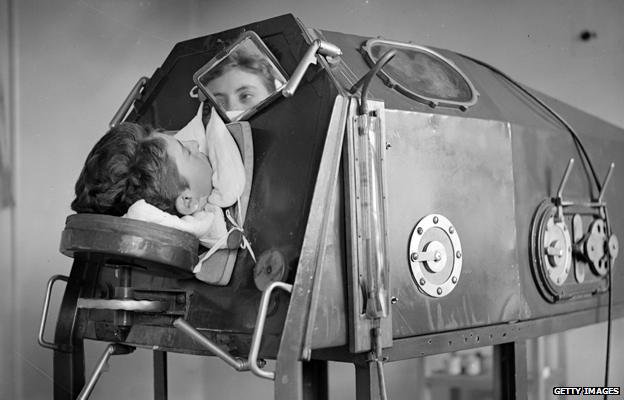
In 1928, Philip Drinker and Louie Shaw developed the "iron lung" to save the lives of those left paralysed by polio and unable to breathe. Most patients would spend around two weeks in the device, but those left permanently paralysed faced a lifetime of confinement. By 1939, around 1,000 were in use in the US. Today, the iron lung is all but gone, made redundant by vaccinations and modern mechanical ventilators.
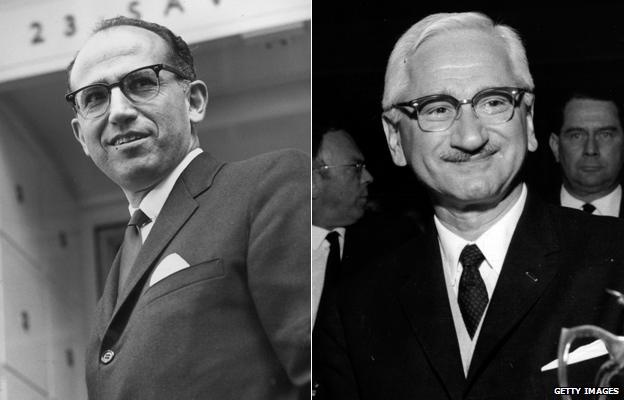
A major breakthrough came in 1952 when Dr Jonas Salk (L) began to develop the first effective vaccine against polio. Mass public vaccination programmes followed and had an immediate effect; in the US alone cases fell from 35,000 in 1953 to 5,300 in 1957. In 1961, Albert Sabin (R) pioneered the more easily administered oral polio vaccine (OPV).
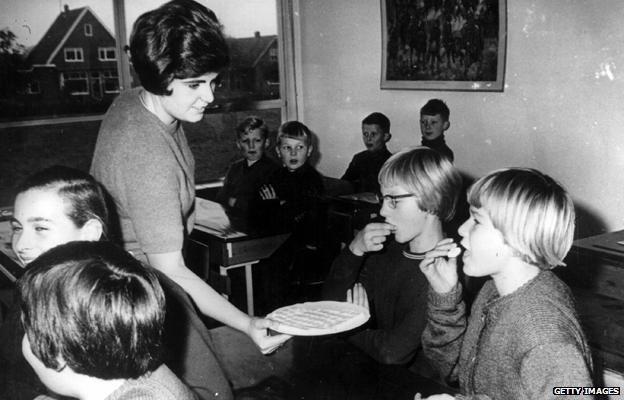
Despite the availability of vaccines polio remained a threat, with 707 acute cases and 79 deaths in the UK as late as 1961. In 1962, Britain switched to Sabin's OPV vaccine, in line with most countries in the developed world. There have been no domestically acquired cases of the disease in the UK since 1982.
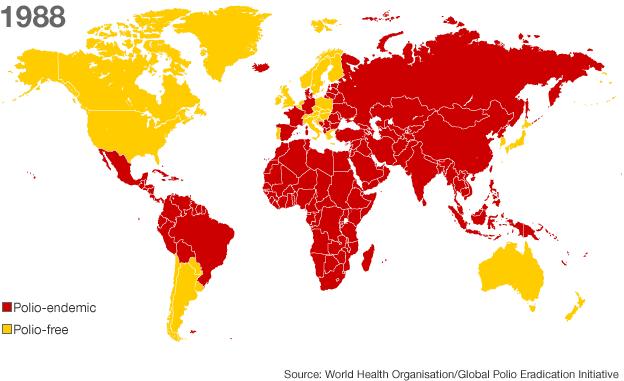
By 1988, polio had disappeared from the US, UK, Australia and much of Europe but remained prevalent in more than 125 countries. The same year, the World Health Assembly adopted a resolution to eradicate the disease completely by the year 2000.
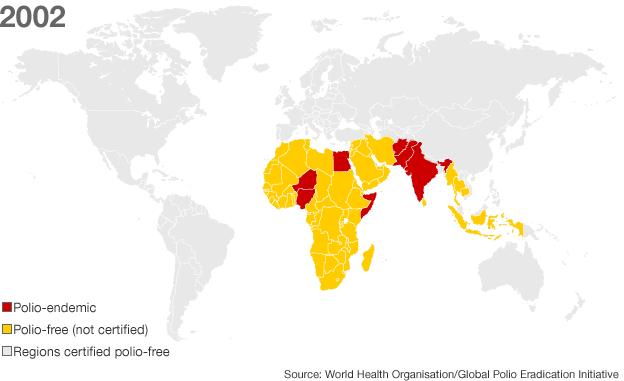
The WHO Americas region was certified polio free in 1994, with the last wild case recorded in the Western Pacific region (which includes China) in 1997. A further landmark came in 2002, when the WHO certified the European region polio-free.
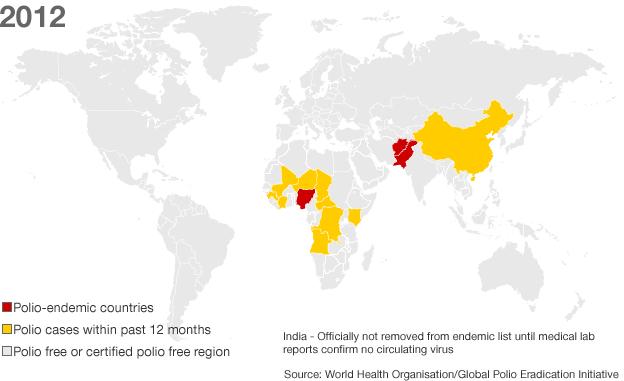
In 2012, Polio remains officially endemic in four countries - Afghanistan, Nigeria, Pakistan and India, which is on the verge of being removed from the list having not had a case since January 2011. Despite so much progress, polio remains a risk with virus from Pakistan re-infecting China in 2011, which had been polio free for more than a decade.
- Published18 December 2012
- Published26 November 2012
- Published17 October 2012
- Published17 July 2012
- Published24 May 2012
- Published20 February 2012